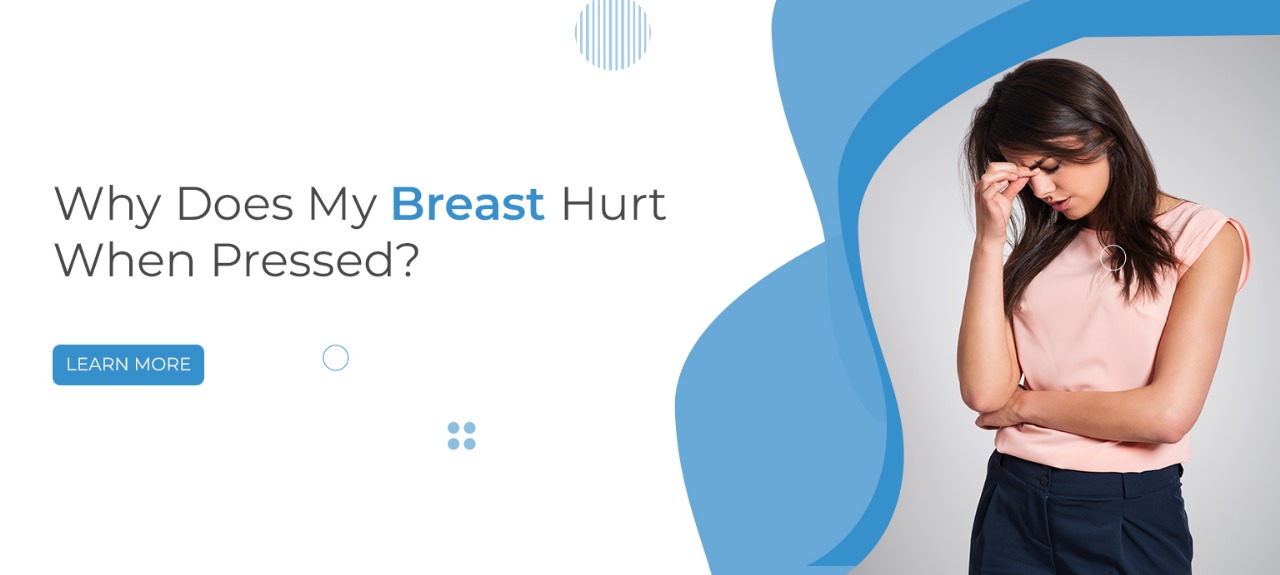Breast pain or tenderness is very common among women. Many women experience mild discomfort or sensitivity in their breasts at some point. However, breast pain specifically when pressure is applied can signal different underlying breast conditions that need evaluation. In this comprehensive guide, we explore the causes, relief solutions, preventive measures, and when to seek expert advice. Plus, discover why Dr. Sayandev DasGupta is best Breast Surgeon in Kolkata.

Causes of Breast Pain When Pressed:
There are three main causes of pain when the breast tissue is pressed or touched – cyclical breast pain tied to the menstrual cycle, benign lumps and cysts in fibrocystic breasts, and round, rubbery benign growths called fibroadenomas. Identifying the specific cause of breast pain through examination and tests allows appropriate treatment to relieve symptoms.
1. Cyclical Breast Pain:
Description: This type of pain occurs on a monthly basis, typically before or during the menstrual period.
Cause: Hormone fluctuations, specifically changes in estrogen and progesterone levels.
Sensation: Women often describe it as a combination of swelling and tenderness.
2. Fibrocystic Breasts:
Description: Characterized by the presence of non-cancerous lumps or cysts in the breast tissue.
Cause: Hormonal changes, more prevalent in women aged 30-50.
Sensation: Feels like tender, ropy tissue within the breast.
3. Fibroadenoma:
Description: Involves the presence of benign (non-cancerous) tumors in the breast tissue.
Cause: Common in women aged 15-35, exact cause often unknown.
Sensation: Typically feels like a round, rubbery lump in the breast.
Solutions for Breast Pain Relief:

Wear a properly fitted bra: A well-fitted bra provides proper support, reducing strain on breast tissue.
Apply heat or ice packs: Alternate use of heat and cold can help alleviate pain and reduce inflammation.
Try OTC pain medications: Over-the-counter pain relievers, such as ibuprofen or acetaminophen, can provide relief.
Reduce caffeine intake: Caffeine has been linked to breast pain; reducing its intake may alleviate symptoms.
Evening primrose or vitamin E supplements: These supplements may help regulate hormonal imbalances contributing to breast pain.
Preventive Measures:
Get regular clinical breast exams: Regular check-ups with a healthcare professional can aid in early detection and prevention.
Perform monthly self-breast exams: Self-exams empower individuals to detect changes or abnormalities early on.
Maintain a healthy diet and weight: A balanced diet and healthy weight contribute to overall breast health.
Limit alcohol intake: Excessive alcohol consumption is associated with an increased risk of breast issues.
Quit smoking: Smoking is linked to various health concerns, including breast-related issues.
When to See a Doctor:

Consult a healthcare professional if you experience:
Persistent or severe breast pain: Ongoing or intense pain that does not subside with self-care measures.
Palpable lumps in your breast: The presence of any unusual lumps or changes in breast tissue.
Nipple discharge: Any abnormal discharge from the nipples.
Redness/swelling of breast: Unexplained redness or swelling that persists.
Family history of breast cancer: A family history of breast cancer may necessitate closer monitoring and early detection efforts.
FAQs about breast pain symptoms and remedies:

Q1. Is it normal for breasts to hurt when pressed?
It can be normal to feel mild tenderness during your menstrual cycle. However, new, persistent, or severe breast pain should be evaluated by a doctor.
Q2. What does breast pain indicate?
Breast pain can indicate hormonal changes, benign breast conditions like fibrocystic breasts, or sometimes a breast infection or injury. Severe breast pain may require medical evaluation.
Q3. How can I tell if breast pain is serious?
See your doctor if you have a palpable lump, nipple discharge, redness, swelling, persistent pain not related to periods, or a family history of breast cancer. These may indicate an underlying breast condition needing further testing.
Q4. What is the best home remedy for breast pain?
Applying heat, ice packs, pain gels, eating a low-fat diet, and minimizing caffeine and salt intake can help provide relief from cyclical and muscular breast pain. Speak to your doctor about persistent breast pain.
Q5. When should I worry about breast pain?
See your doctor urgently if breast pain is sudden and severe along with symptoms like redness, swelling, nipple discharge, inverted nipple, rash, fever or a clear abnormality in your breast upon self-exam. These may indicate a breast infection or other issue needing quick treatment.
Conclusion
Occasional mild breast pain is common and often not a cause for concern. However, new, persistent, or worsening breast tenderness should be evaluated promptly by an experienced breast health specialist, especially over the age of 40. Getting appropriate tests and diagnosis is key to detecting any serious underlying problems early.
Why Dr. Sayandev Dasgupta is considered the best breast surgeon in Kolkata:
Dr. Sayandev DasGupta is considered the best breast surgeon in Kolkata and one of the best laparoscopic surgeons in the city. His decades of experience also make him Kolkata’s most senior and prominent general and laparoscopic surgeon. Dr. Dasgupta provides personalized care and advanced surgical treatments for all benign and malignant breast diseases. He is dedicated to compassionate, skilled care for those needing breast and laparoscopic surgery.



